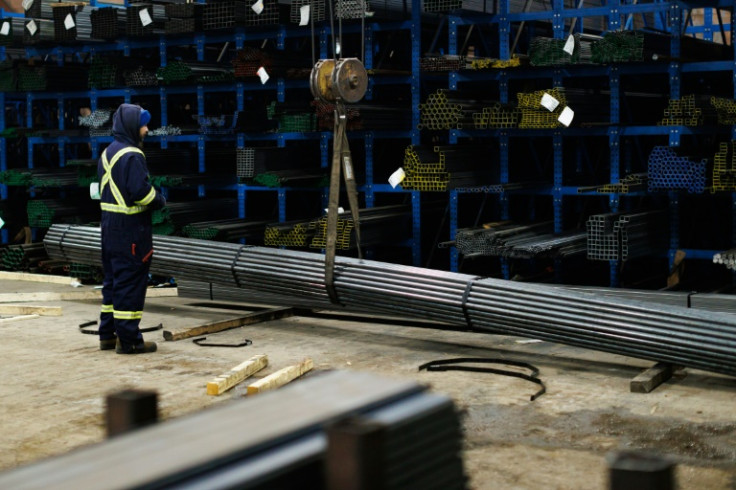EU's 50% Steel Tariff Sparks Trade Tensions with UK — Industry Fears Deep Losses

KEY POINTS
- The European Union has announced plans to impose a 50% tariff on steel imports that exceed new, reduced quota limits.
- The new tariffs could halve the amount of steel the UK can export tariff-free to the EU.
- The UK Steel industry warned that the measure could trigger 'perhaps the biggest crisis' in its history.
Britain's steel industry is on high alert after the European Union unveiled plans to impose 50% tariffs on steel imports, a move experts say could trigger the sector's worst crisis in decades.
The European Commission announced on Tuesday that it would halve the quota for tariff-free steel imports, applying the new duties to any shipments that exceed that limit. The policy aims to protect Europe's steelmakers from a flood of cheaper imports from China, Turkey and India, but British manufacturers fear it will devastate an industry already under strain.
The EU remains the UK's biggest export market for steel, worth nearly £3 billion a year and accounting for almost 80% of Britain's overseas steel trade. Losing access to that market without prohibitive costs could be catastrophic.
'This could be the biggest crisis the UK steel industry has ever faced,' warned Gareth Stace, director-general of UK Steel. 'For many companies, this is the difference between survival and collapse. We are already competing in a tight market, and this effectively prices British steel out of Europe.'
EU Defends Move as Protection Against 'Dumping'
In Brussels, officials defended the plan as a necessary safeguard against global overproduction and the dumping of cheap steel. The European Commission said the new tariffs would prevent the bloc's market from being 'flooded by underpriced imports'.
'We have to protect our strategic industries and the millions of workers they employ,' an EU spokesperson said. 'The measures are temporary and targeted, designed to ensure fair competition.'
British analysts, however, called the move thinly veiled protectionism. They warn that the timing could not be worse for UK steelmakers already battling high energy costs, post-Brexit red tape and fierce global competition.
'British steel exports are facing obstacles on every side,' said Alastair MacDonald, a trade economist. 'We've had U.S. tariffs, Chinese overcapacity and now this from the EU. The combined impact could be catastrophic for plants in Wales, Yorkshire and the Midlands.'
UK Government Seeks Urgent Clarification
The UK government said it would seek urgent clarification from the European Commission and explore ways to soften the blow.
'We are in close contact with both the EU and the domestic steel sector to understand the full implications of these measures,' said a spokesperson for the Department for Business and Trade. 'The UK will continue to work with partners to ensure fair and open trade for our manufacturers.'
Officials are reportedly considering bilateral talks and may appeal to the World Trade Organization if the tariffs are deemed to breach post-Brexit agreements. However, analysts warn that any legal challenge would take months, leaving steelmakers vulnerable to immediate losses.
Global Oversupply and Domestic Pressures
The EU's move follows growing pressure from European steel producers struggling to compete with low-cost imports. Member states such as France and Italy lobbied for tighter restrictions, arguing that cheap Asian steel was undercutting domestic output and threatening thousands of jobs.
'Europe is reacting to the same pressures facing every steel-producing nation,' said trade consultant Helen Frost. 'China's oversupply has depressed prices worldwide, and governments are turning to tariffs as a form of industrial defence.'
The decision, however, risks reigniting post-Brexit trade tensions between London and Brussels at a time when both sides are attempting to rebuild trust.
A Blow to Britain's Steel Towns
Steelmaking hubs such as Port Talbot, Scunthorpe and Rotherham could be among the hardest hit. Industry leaders fear that a drop in exports could lead to more layoffs and closures across the supply chain.
'Steelmaking is at the heart of our industrial identity,' Stace said. 'These tariffs don't just threaten factories, they threaten entire communities built around them.'
The new EU rules are expected to be finalised in the coming weeks, pending approval from member states and the European Parliament. Unless an exemption or compromise is reached, UK steel exports could face the new tariffs as early as next year.
The Road Ahead
While the European Commission insists the measures are temporary, few in Britain's steel sector are reassured. Once a pillar of British industry, the sector has been reduced to a fraction of its former strength and now faces yet another challenge — this time from its closest trading partners.
'We can only hope dialogue prevails,' said Frost. 'Otherwise, this could mark a turning point in Europe's steel story, and not in a good way.'
© Copyright IBTimes 2025. All rights reserved.




















